There is not a single food as Colombian as the arepa. Period. Arepas are round corn cakes and are generally eaten for breakfast, as a side to the main dish, or as a snack. Yes, that’s right: arepas you can eat all day every day. And that is not a punishment, I can assure you. Crispy on the outside and soft on the inside, they are always a treat.
Jump to RecipeEsta receta también está disponible en Español.
History of the Arepa
In many parts of Central and South America, corn or maize has been one of the most important crops. Therefore, it is not surprising that the arepa has its origin centuries ago, in pre-Colombian times. That also immediately settles the dispute of who can claim the arepa: Colombia or Venezuela. Both can, or neither, as people have been making arepas even before Colombia and Venezuela became the nations we know now. That is, the indigenous people have been making similar corn cakes before the Spanish set foot in these territories. How old this dish may seem, is still very, very popular, and for good reason.
Perfect Arepas Colombianas
I must say that my quest for the perfect arepa was not easy, given the different opinions that people have on the subject. After trying out many recipes I found that my mother-in-law’s version is the simplest and the best. It only contains the following ingredients:
Cornmeal, water, butter, and salt. Nothing else and no cheese. If you like arepas with cheese (like I do), check out this recipe for Cheese-Stuffed Arepas. The cheese is added to the arepa, instead of adding it to the dough, which works a million times better.
Types of arepa
These Arepas Colombianas (Colombian Corn Cakes) are the traditional breakfast or snack type of arepa, at least in Bogotá. Apart from little differences in how to prepare the dough, there are whole different types of arepas. For example:
- Arepas de Choclo/ Chocolo, are made of cornmeal and cheese and taste slightly sweet
- Arepa Boyacense (from the Colombian department Boyacá), made of cornmeal, wheat flour, cheese, and sugar or panela (unrefined cane sugar)
- Popular on the Caribbean Coast is the Arepa de Huevo, where the arepa is filled with an egg and deep-fried
- Arepa made of yuca (cassava) or plantain
Basically, every region has its own type of arepa, and within these subcategories, there are differences in exact ingredients and ways of cooking them. I hope to feature all of these delicious types of arepas in the future.
Ingredients
You don’t need much. You need precooked cornmeal made of white corn, sometimes also called masa de arepa. It is available in Latin-American supermarkets and online. I like the brand P.A.N., but there are many different brands selling precooked cornmeal. Apart from cornmeal, you will need water, butter, and salt. In terms of equipment, you could use an arepa-press. I don’t own one, but I do own a patacon press (to make Patacones (Fried Green Plantains)). If you don’t have either of those, using your hands or a rolling pin will work just fine. To cook the arepas you need a frying pan or skillet.
When to eat
These arepas are delicious for breakfast, for example with huevos pericos (Colombian scrambled eggs), hogao (tomato onion sauce), and/or cheese. You can eat them as a snack, stuffed with cheese, or make a complete meal out of them by filling them with everything that is good.
Tips and tricks
- Use warm water instead of lukewarm (as is often recommended). The warm water makes the butter incorporate into the dough much easier and better
- Do not bake them in butter, as the dough itself is greasy enough
- Be aware that you might have to add a bit more or less water, as different brands of cornmeal seem to take up different amounts of water. Check after you rested the dough because cornmeal takes up water over time. What might look too wet before resting, might actually be on the dry side when ready to bake
Vegan Arepas
You can easily make these arepas vegan, by replacing the butter with 1 tablespoon of vegetable oil. The rest of the ingredients and instructions remain the same.
Try it yourself!
Do you love Colombian food? Click here for more vegetarian recipes!
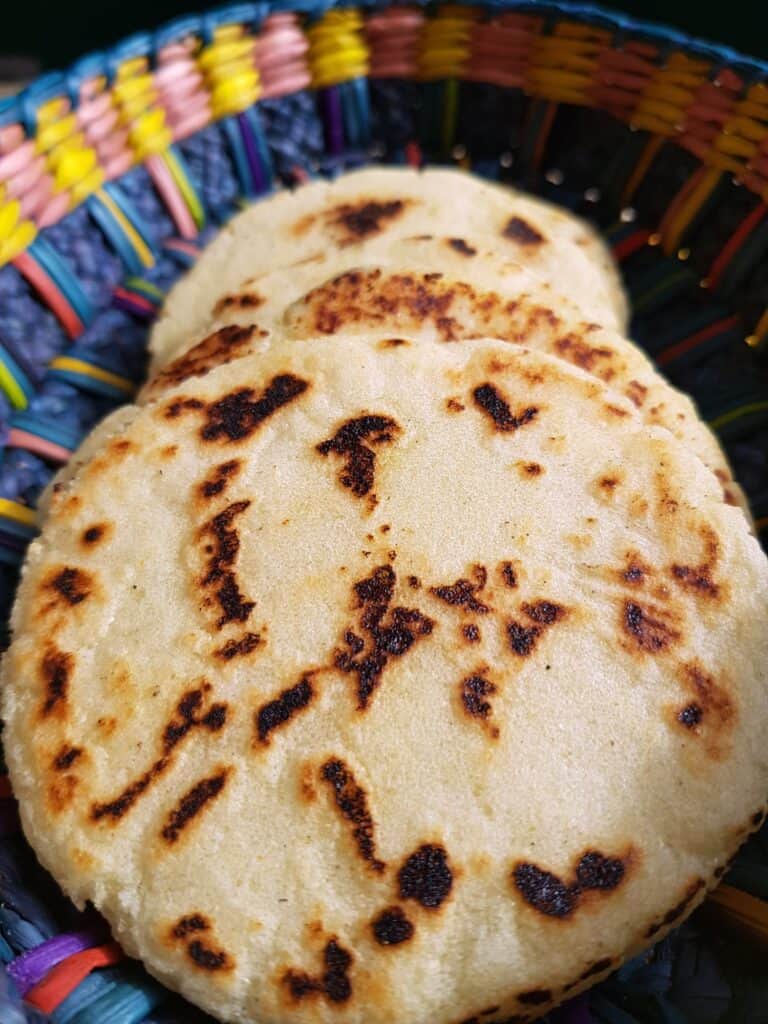
Other recipes you might love:
Arepas de Queso Colombianas (Cheese-Stuffed Corn Cakes) (well, the name says it all…)
Arepas Rellenas (Arepas Stuffed with Hogao, Avocado and Cheese) (make a lunch or dinner out of the arepa!)
Arepas de Choclo (Colombian Sweet Corn Cakes with Cheese) a different type of arepa using canned corn instead of cornmeal
Vegan Colombian Tamales (if you want something else for breakfast)
Vegan Colombian Breakfast Calentado (a super hearty and big breakfast)
Colombian Fried Chickpea Pasties (Pasteles de Garbanzo) (fried dough with a chickpea filling)
.
.
Do you love this recipe? Give it a 5-star rating below and leave me a comment! Or tag @vecinavegetariana on Instagram. You can also pin this recipe now and make it later.
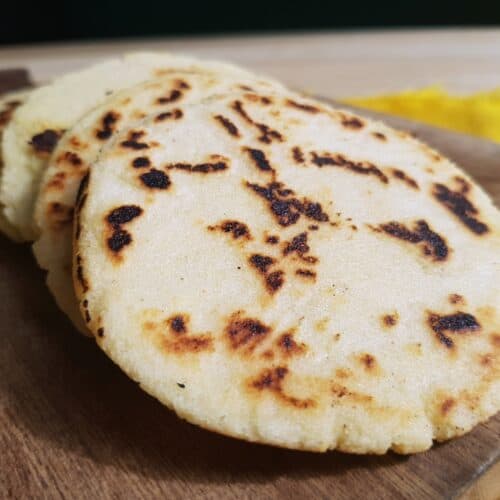
Arepas Colombianas (Colombian Corn Cakes)
Equipment
- Something to press the arepas: an arepa-press, a patacon-press, a rolling pin, your hands
Ingredients
- 1 cup precooked cornmeal made of white corn
- 1 cup warm water
- 2 tbsp butter, room temperature (replace by 1 tablespoon of vegetable oil, when making vegan arepas)
- salt, to taste
Instructions
- Prepare the dough. Add hot water to a mixing bowl. Add cornmeal and mix with a fork. Add butter (or oil) and salt, and mix again with a fork. Then mix with your hands to make sure the butter is fully incorporated in the dough. The dough should feel soft, light, and slightly wet
- Let the dough rest for 15 minutes.If the dough feels a bit wet, letting the dough rest for a couple of minutes allows the cornmeal to soak up the water
- Divide the dough in 4-5 balls of equal size. Shape them in round discs of about 10 cm wide and 1 cm in thickness. Use any press like an arepa-press or patacon-press, a roller pin, or just your hands
- Bake in a frying pan. Generally it is not necessary to add oil or butter to the pan. If you find your arepas stick too much, do add some butter or oil. Bake them on a high fire, about 3-4 minutes per side, until they have some color and some dark spots
- Serve hot for breakfast, as a side dish or as a snack
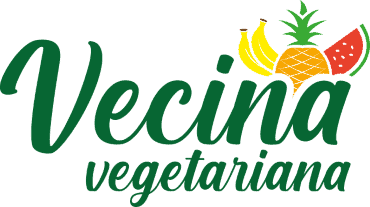
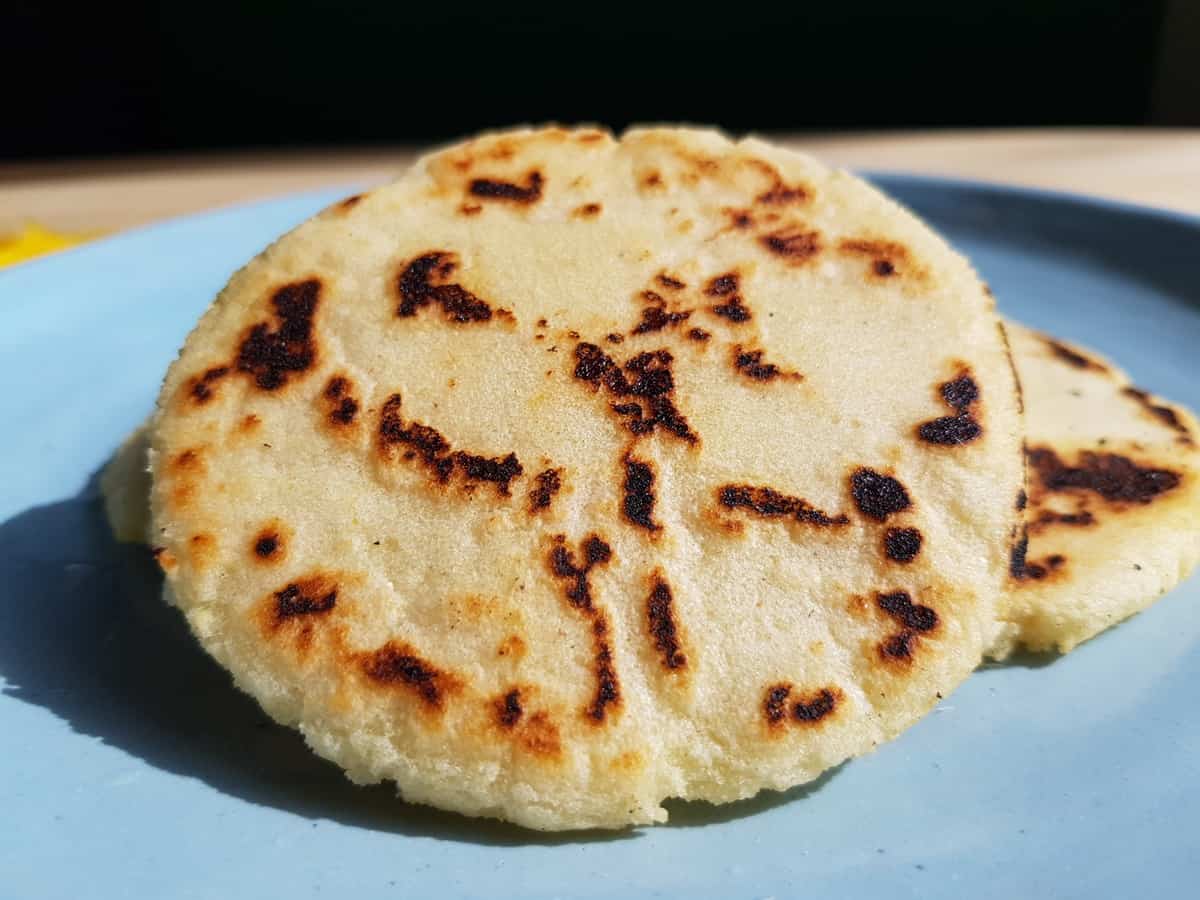
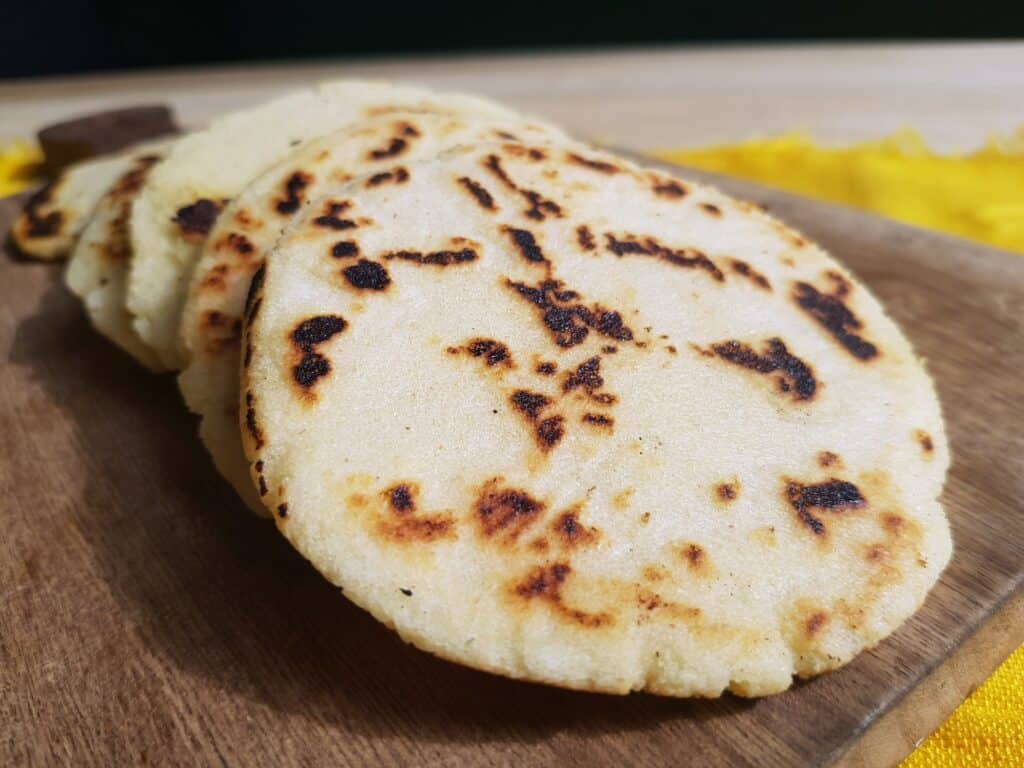
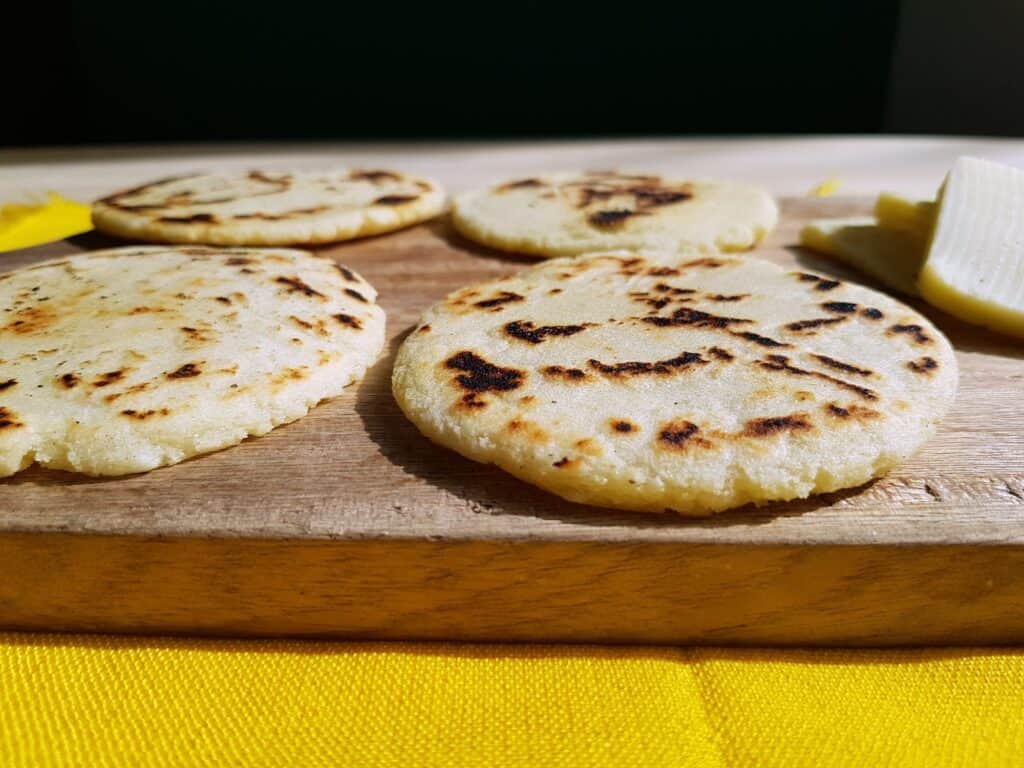
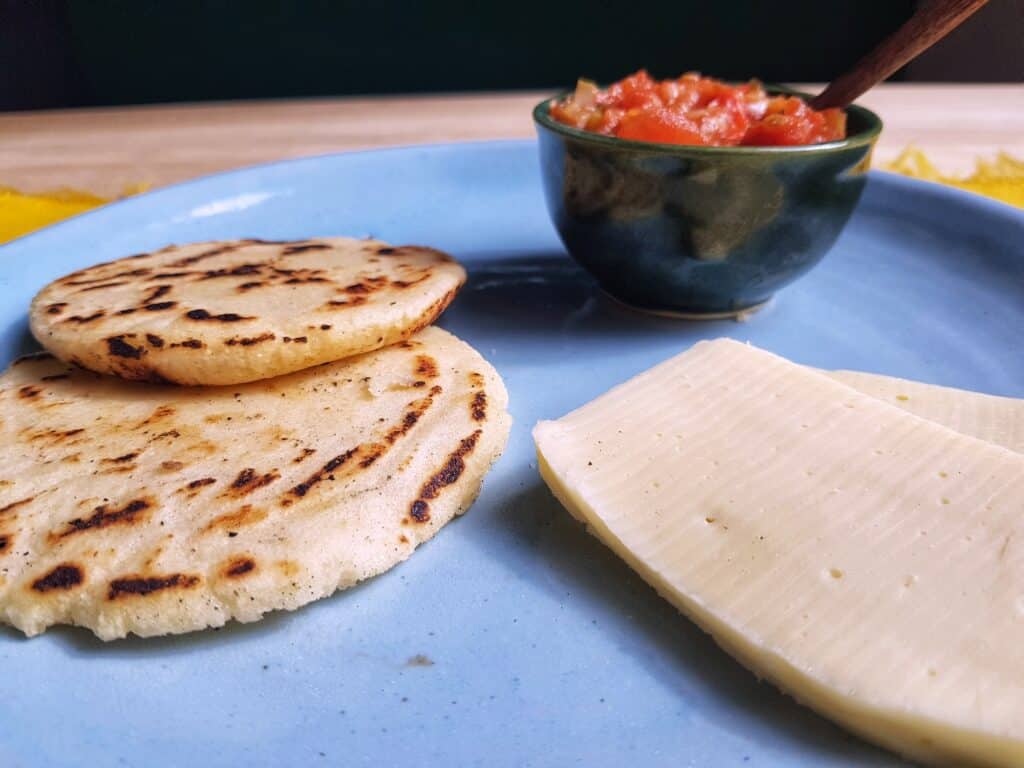
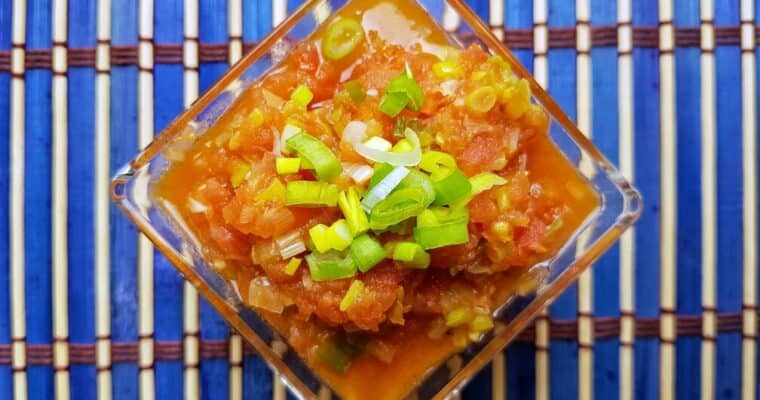
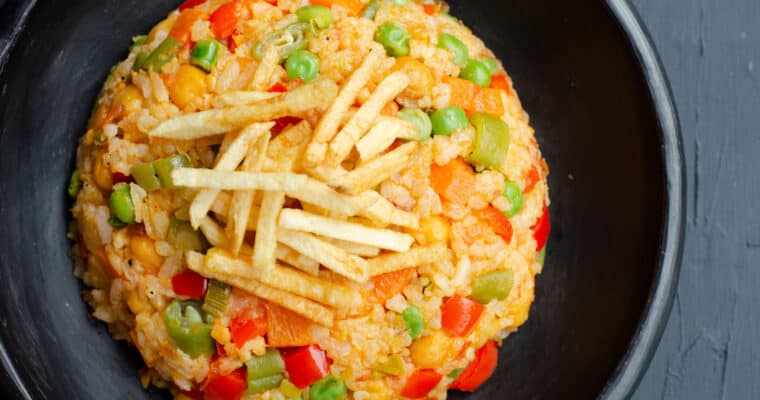
Tasts good, but I had to experiment a bit, because the first batch was too wet.
Sorry to hear. That happens sometimes, resting the dough allows the cornmeal to soak up more water and if it stays too wet, adding some extra cornmeal does the trick. Great to hear you liked the taste!
They came out great! Super easy to make and just like I remember them from my trip to Colombia.
That’s great to hear. Thank you for trying out the recipe!
Really easy to make, for Saturday morning breakfast with an egg, And a perfect Arepas taste like the good ones that we ate in Colombia.
That’s fantastic, happy you liked it 🙂 thank you for leaving a comment!